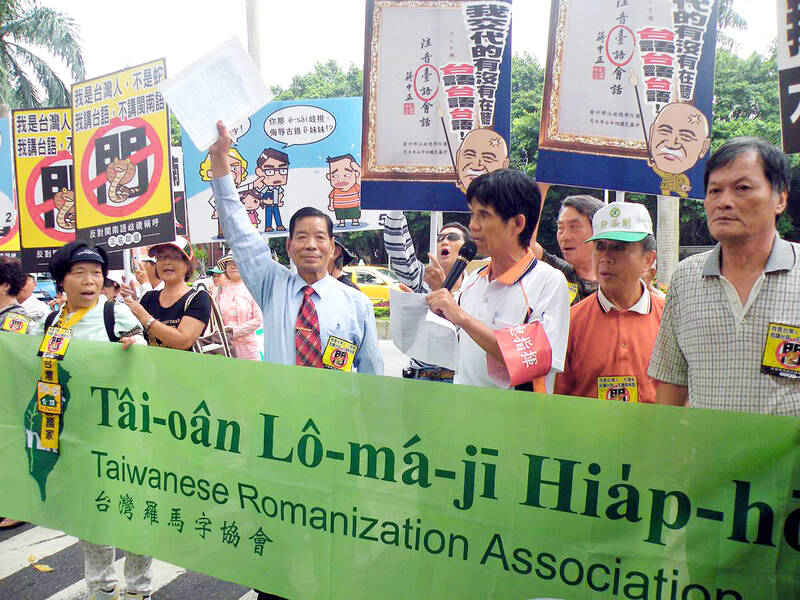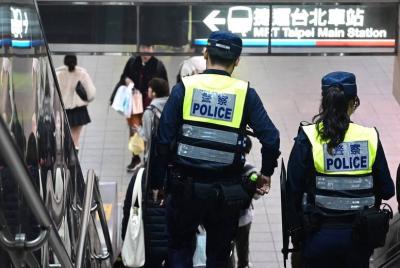Pro-Taiwan localization advocates on Wednesday launched a signature petition to assert their language rights and the right to use the name “Taiyu” (台語) to officially describe the language of the majority of people in Taiwan, in a protest against Chinese Nationalist Party (KMT) lawmakers who are seeking to revert to the language’s former name, Minnanyu.
The petition aims to gather support for the Ministry of Education, which in July announced that starting with language proficiency examination, it would change the language’s formal name to “Taiyu” from “Minnanyu” (Hokkien or Southern Min, 閩南), and would intend to use the new term in official notices and government documents.
At a hearing at the legislature’s Internal Administration Committee on Wednesday, KMT Legislator Hsu Hsin-ying (徐欣瑩) opposed the term “Taiyu,” alleging that its use would infringe on the rights and status of other languages spoken in Taiwan while also questioning the suitability of the term “Taiyu” under the official legal definition as being among Taiwan’s “national languages.”

Photo courtesy of the National Cheng Kung University’s Taiyu Research Office
Hsu, an ethnic Hakka, requested reports from government ministries and questioned officials on reasons for the change to “Taiyu,” which Hsu claimed would elevate its status and threaten the use of Hakka and the languages of Taiwan’s indigenous peoples.
Deputy Minister of Culture Lee Ching-hwi (李靜慧) said that “Taiyu is a special term and is not intended to refer to all other languages in Taiwan.”
“Taiyu is one of our national languages, and its status is equal to Hakka, all languages of Taiwan’s indigenous peoples, the Mindong language of Matsu Island and Taiwan Sign Language,” Lee said.
“The new term for Taiyu would not infringe on all these other languages recognized as our national languages... Taiyu, as well as Hakka, and indigenous languages are facing a crisis of dying out, and need government resources to protect and preserve them and pass them on to the younger generation,” Lee said.
Taiwan localization groups and language rights activists condemned Hsu for organizing the hearing, calling it an attempt by the KMT to pressure government ministries, stop the “Taiyu” language rights movement and turn back the clock to using the term “Minnanyu,” as its way of “continuing to denigrate Taiwanese.”
In a statement, Taiyu language advocates accused Hsu of upholding the past policy of “Mandarin Chinese” supremacy, while also protecting the Hakka ethnicity, and deliberately forcing the assimilation and marginalization of Taiyu and Taiwan’s indigenous peoples’ Austronesian languages.
Chiung Wi-vun (蔣為文), professor of Taiwanese literature at National Cheng Kung University, said Taiyu is a specific term and does not extend to other languages.
Chiung accused Hsu of having the mindset of a “Hakka chauvinist” by claiming that Taiyu would erase Hakka and Taiwan’s indigenous languages.
Chiung and other advocates said that the government had approved the Development of National Languages Act (國家語言發展法) in 2019 to certify that all “natural languages” used by ethnic groups in Taiwan are national languages.
They added that Article 33 of the Universal Declaration of Linguistic Rights passed in 1996 states that “all language communities have the right to refer to themselves by the name used in their own language.”

Beijing could eventually see a full amphibious invasion of Taiwan as the only "prudent" way to bring about unification, the US Department of Defense said in a newly released annual report to Congress. The Pentagon's "Annual Report to Congress: Military and Security Developments Involving the People's Republic of China 2025," was in many ways similar to last year’s report but reorganized the analysis of the options China has to take over Taiwan. Generally, according to the report, Chinese leaders view the People's Liberation Army's (PLA) capabilities for a Taiwan campaign as improving, but they remain uncertain about its readiness to successfully seize

Taiwan is getting a day off on Christmas for the first time in 25 years. The change comes after opposition parties passed a law earlier this year to add or restore five public holidays, including Constitution Day, which falls on today, Dec. 25. The day marks the 1947 adoption of the constitution of the Republic of China, as the government in Taipei is formally known. Back then the Chinese Nationalist Party (KMT) governed China from Nanjing. When the KMT, now an opposition party in Taiwan, passed the legislation on holidays, it said that they would help “commemorate the history of national development.” That

Taiwan has overtaken South Korea this year in per capita income for the first time in 23 years, IMF data showed. Per capita income is a nation’s GDP divided by the total population, used to compare average wealth levels across countries. Taiwan also beat Japan this year on per capita income, after surpassing it for the first time last year, US magazine Newsweek reported yesterday. Across Asia, Taiwan ranked fourth for per capita income at US$37,827 this year due to sustained economic growth, the report said. In the top three spots were Singapore, Macau and Hong Kong, it said. South

Police today said they are stepping up patrols throughout the Taipei MRT system, after a social media user threatened to detonate a bomb at an unspecified station this afternoon. Although they strongly believe the threat to be unsubstantiated, Taipei Metro police and the Railway Police Bureau still said that security and patrols would be heightened through the system. Many copycat messages have been posted since Friday’s stabbing attacks at Taipei Main Station and near Zhongshan MRT Station that left three dead and 11 injured, police said. Last night, a Threads user in a post said they would detonate a bomb on the Taipei